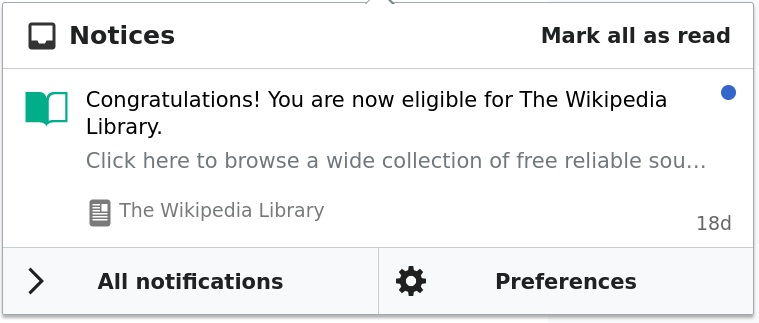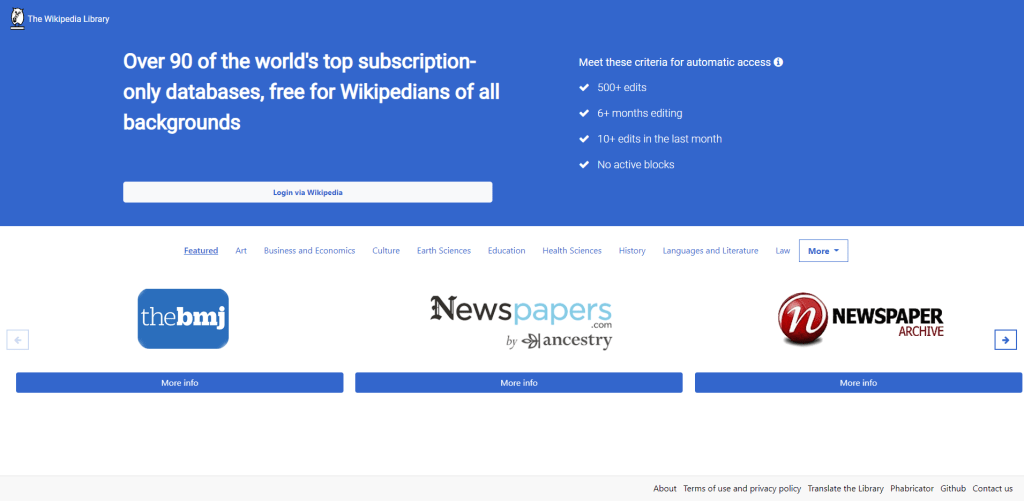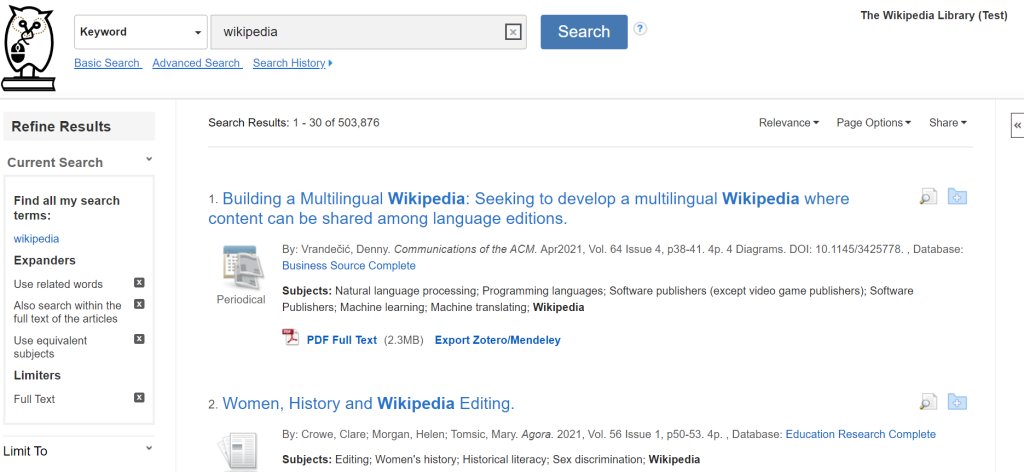Active editors can now make use of a cross-publisher search platform and a new interface design for The Wikipedia Library, which provides free access to research materials to improve your ability to contribute content to Wikimedia projects. We are also excited to share that editors will now receive an on-wiki notification about the library when they become eligible to start using it!
If you’re an active editor who has made more than 500 edits and your account is more than 6 months old you can go ahead and start using the library right away. Read on for more information on the improvements we’ve been making recently.
Nine years ago, Wikipedia editor Jake Orlowitz asked Highbeam – an aggregator of news articles, academic journals, and other reliable sources – if they might be able to provide him with a free account to their website so that he could do research for a Wikipedia article. They offered him 1,000 accounts, and encouraged him to distribute them amongst Wikipedia’s editing community so that everyone who wanted to use their resources on Wikipedia could do so.
Since then, a further 75 organisations have partnered with the Wikimedia Foundation to provide thousands of Wikipedia editors with free access to paywalled sources. Over this time, the program became a fully resourced project at the Wikimedia Foundation, and plans were made for a centralised signup and distribution tool capable of providing seamless searching and access capabilities for library users.
We’re really pleased to announce that we’ve finally reached the major technical milestones we set out to achieve in those early plans!
Centralized search
When we centralized Wikipedia Library signups on the Library Card tool in 2017, our main goal was to allow users to browse and access all of the library’s collections from one place. Until now, however, library users have been required to search each organisation’s collections individually, wasting valuable research time. As of today, editors can use EBSCO Discovery Service to browse content from a wide range of databases with a single search. The search bar is available in the library’s header once you’ve logged in, and searching a topic will pull results from a wide variety of collections.
By default, search results will display content from publishers participating in the Library Bundle – the default content available to all eligible users – so that you can browse with confidence knowing that all results can be accessed. We are also exploring adding an option to turn this limit off.
We hope this will make your research experience more enjoyable and comprehensive, and would love to hear from you with any feedback or issues on the search project page.
Design update
Alongside the integration of a search tool, we’ve also redesigned the user experience for some of the library’s most important workflows: the homepage and ‘My Library’ (now My Collections).
With so many new users coming to the library over the coming months (see the notification section below!), we wanted to ensure an optimal user experience. Based on user research, we found that new users were often confused about who the library was for and why it might be useful to them. Our new homepage provides a simpler onboarding experience, with brief information about what the library is, and functionality for at-a-glance browsing of the available collections.
We’ve combined the list of collections you do and don’t have access to into the same interface, with tag and filtering functionality which allows you to find the content you’re most interested in. We’ve also simplified the library’s eligibility criteria, which has allowed us to make further refinements to the user interface. You can provide feedback on the overall UX of the library at the design project page.
Expanding awareness
More than 90% of the library’s current users come from the English Wikipedia, but the library has content in a wide variety of languages (we’d like it to be even more diverse) and is accessible to all active editors, regardless of which project they contribute to. To attempt to bridge this gap and ensure that all editors who might be interested in using the library are aware of it, we’re rolling out an on-wiki notification to eligible editors.

When an editor crosses the library’s eligibility threshold, they will receive an Echo notification informing them that they now qualify for the library. This will also be sent retroactively to all users who already qualify, and users should only receive this notification once.
This rollout is happening in stages over the coming weeks, so don’t worry if you haven’t received it yet. Further details on the deployment schedule can be found on Phabricator at T288070.
We hope that all of these changes make the library more welcoming, useful, and enable it to be used by a broader range of Wikimedia community members. If you have any thoughts or feedback, the team can be contacted at wikipedialibrary@wikimedia.org or on Meta.
You can also suggest new collections be added to the library – we’re always growing our available content through new partnerships and prioritise based on these suggestions.

Can you help us translate this article?
In order for this article to reach as many people as possible we would like your help. Can you translate this article to get the message out?
Start translation

